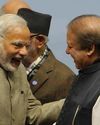The Prisoner’s Dilemma and the inability of people to collaborate for the common good may be a roadblock on the path to global peace.

GLOBAL, NATIONAL AND local societies face many threats. We are threatened by enemies—internal and external—who want to destroy our way of life. We are plagued with environmental degradation as we quickly try to ramp up the economy and improve our living standards. Finally our own social systems are in tatters because efforts to mitigate the effects of the first two reasons are stymied by venal corruption and a cynical disregard for the rule of law. In fact the last reason is perhaps the most overarching reason, because it leads to the other two.
We have solutions to most of our problems. Technology solutions are available to grow more food, generate more energy, combat disease and check crime. There are public structures like hospitals, schools, municipal, state and central governments, the legislature, each having its own set of rules and procedures, to guide and govern matters. There are commercial structures, like corporates, cooperatives and professional networks that transform natural and human resources into disposable surplus that can be used for material pleasure. Then there are clubs, non-profits and political parties that lubricate the gears and facilitate the work of the public and private structures. Finally, we have a whole set of checks and balances, like police, the courts of law, and institutions that recursively keep checks on the checks and balances, like the Vigilance Department, the CBI and the LokPal to ensure that everyone does what they should. So in principle, if everything were to work like clockwork, there should not be any unresolved problems on the planet.
This story is from the May 2017 edition of Swarajya Mag.
Start your 7-day Magzter GOLD free trial to access thousands of curated premium stories, and 9,000+ magazines and newspapers.
Already a subscriber ? Sign In
This story is from the May 2017 edition of Swarajya Mag.
Start your 7-day Magzter GOLD free trial to access thousands of curated premium stories, and 9,000+ magazines and newspapers.
Already a subscriber? Sign In

Refuging Progess
There is a well-orchestrated global conspiracy to deny scientific and technological developments from the West to Third World countries.

The Monk Of Science
Vivekananda believed that Religion should be subjected to scientific methods of investigation. The third and concluding part of our series on the Swami and his views on science.
The Next Step
Indian technical manpower can be trained for high-value-added emerging services in the era of mass commoditisation of hardware.
The Threat Of Autarchy
The force of globalisation is an irreversible reality, and it is countries like India and China that will nurture it going forward.

Neanderthals: The Womb Of Caves
Recent discoveries indicate that Neanderthals may have had a rich inner life, including symbolic thought. Indeed, they may have been the progenitors of human religions.

Getting India's World Right
Incremental concessions will get India nowhere with Pakistan and China. What we need is a classically conservative foreign policy, based on realism.

The Hesitant Orbit
In order to march boldly ahead into the deep space, New Delhi must work towards building a station, boost its techno-economic planning and use the Indian Space Research Organisation smartly.

Nudges And Narratives
The debate surrounding Sanjay Leela Bhansali’s Padmavati brings India a complex network of portraits within a cultural world-system.

The Spell Of Specialisation
THE INDIAN ADMINISTRATIVE SERVICE NEEDS AN URGENT REJIG. THE KEY TO SPEED AND EFFICIENCY LIES IN PUTTING AN END TO A GENERALIST APPROACH AND IN GOING FOR A NEW SERVICE.
The Great Gamble
With demonetisation, the prime minister has taken a huge risk— both economic and political. He must succeed, because this move could transform both our economy and our society.